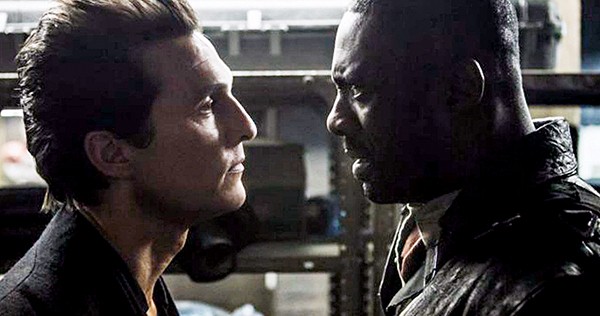Stephen King can’t catch a break.
I’m speaking filmically, of course. In all other aspects of his life, King is doing fine. He is probably the most successful writer of the last 50 years. He’s the Charles Dickens of horror, to be read widely and remembered far longer than his contemporaries, even the ones who might have had superior talent. King is a good writer, but he has had fantastic agents.
King’s work has been adapted for film (checks Wikipedia) 67 times! That’s a lot! (The Mangler had two sequels? Who knew?) But with the very notable exceptions of The Shining, The Shawshank Redemption, and Stand by Me, movies based on King’s works have been pretty awful. (I admit, I have a soft spot for The Running Man, but that was technically a Richard Bachman book.)
The Dark Tower was King’s attempt at epic meta-fantasy and the project that he chipped away at between blockbuster airport paperbacks for 40 years. Clearly inspired by Tolkein, it’s not so much singing dwarves and lembas as it is a deep dive into King’s subconscious. The Dark Tower sits at the center of at expansive multiverse, protecting the multitude of realities where anything goes. Instead of knights in shining armor, the Tower — and thus, all of the multitudes of realities in the multiverse — is defended by a sacred order of Gunslingers, refugees from Sergio Leone spaghetti westerns that King was obsessed with when he started the series in the early 1970s. Bits and pieces of King’s passing obsessions and his other books float up through the more than 4,000-page narrative. At one point, King himself makes an appearance as both author and character. In the age when HBO is dropping a cool 10 mil on every hour of Game of Thrones, The Dark Tower‘s seven volumes sound like the perfect fodder for a long-running prestige TV series. Instead, we get this chop job.

Matthew McConaughey (left) fled across the desert, and Idris Elba followed.
Idris Elba was born to play Roland, the supernatural protagonist, last of the Gunslingers. He’s got the natural gravitas and credibility as an ass kicker. Roland’s gun was forged from the sword Excalibur, and he “kills with his heart,” as the Gunslinger’s credo requires. Roland’s sworn enemy is the Man in Black, played by Matthew McConaughey, so pencil thin he seems to have been existing purely on Soylent paste and self-satisfaction.
Armed with the power of suggestion, an army of demonic lackeys, a snazzy Zara for Men duster, and a variety of colored orbs, the Man in Black seeks to destroy the Dark Tower and let in the demons from the dark outer-world so he can … do something. There was a prophecy that said the mind of a child could destroy the Dark Tower, so the Man in Black’s minions prowl the multiverse finding younglings strong in the Shining to feed into his kid-powered super-laser. I was not really clear on what he was hoping to accomplish with the destruction of the multiverse, but maybe if McConaughey put more than a car commercial’s level of effort into the role, I wouldn’t mind.
The young Brooklynite Jake Chambers (Tom Taylor) is the latest in a line of generic “chosen ones,” complete with evil step family and doomed mother. While in our reality, (“Keystone Earth”), he is repeatedly upstaged by his neighbor Timmy, played by Michael Barbieri of Ira Sach’s Little Men. Director Nikolaj Arcel would have been better off casting Barbieri as his audience surrogate, given how completely charisma-free Taylor is.
The literary Dark Tower is the result of a prodigious mind high on the writings of Joseph Campbell and, in the ’70s and ’80s at least, heroic doses of drugs. But instead of floating freely in Jungian archetypal space, the film just touches all the bases of another generic post-Matrix action fantasy. In the grand scheme of this summers’ colossal wastes of money, it goes down easier than, say, the Pirates of the Caribbean death rattle. But I liked The Dark Tower much better when it was called Big Trouble in Little China. At least Kurt Russell knew how to commit to the ridiculous.